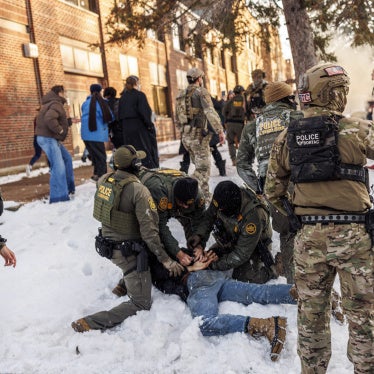The debate over a permanent international criminal court is coming to a head. The Clinton administration is threatening to walk out of U.N. deliberations in New York unless its proposal to exempt U.S. citizens is accepted by June 30. Meanwhile, Sen. Jesse Helms and his Republican allies have introduced a bill threatening sanctions against governments that support the court.
No one expects the United States to embrace the court anytime soon. Benign neglect is the most that can be hoped for. But the vehemence of U.S. objections is founded in part on important misconceptions. These are illustrated by Fred Hiatt's column "Internationally: War Crimes Sanctimony" [op-ed, June 19].
By providing a forum to prosecute the authors of genocide, war crimes and crimes against humanity, the court is designed to curtail the impunity that has fueled the worst atrocities of our time. Hiatt charges that the court will in fact have the opposite effect by discouraging military intervention to stop such crimes. The remote possibility that the court could prosecute American military personnel, he contends, might ensure that the United States "never stages a humanitarian intervention again."
Recent history refutes that claim. The Pentagon willingly participated in bombing campaigns over Serb depredations in Bosnia in 1995 and Kosovo in 1999. Yet in each case, U.S. troops were subject to prosecution by the Yugoslav War Crimes Tribunal. Indeed, the tribunal arguably posed a greater threat to U.S. forces than the international criminal court, because any tribunal decision to prosecute would have superseded the views of U.S. authorities. The court, by contrast, must defer to conscientious investigations by national authorities, even if they decide against prosecution.
Hiatt compares political supervision of the court unfavorably to that of the Yugoslav tribunal. The tribunal, he asserts, must be "sensitive to political ramifications" of its actions because it was created by the U.N. Security Council. But the court, he claims, "will operate with almost no external checks and balances." Here again he is mistaken.
The Security Council's capacity to rein in a hypothetical runaway tribunal is limited by the veto power of the council's permanent members. China or Russia, as well as Britain and France, could single-handedly block U.S. efforts to curb an inappropriate tribunal prosecution. The prosecutor of the international criminal court, by contrast, can be dismissed for misconduct by a simple majority of the governments that ratify the court's treaty. Moreover, before the need for such a political check even arose, a defendant alleging inappropriate prosecution by the court would be entitled to review by up to three separate judicial panels.
For an example of the caution that marks these international proceedings, consider the tribunal's treatment of NATO's bombing campaign in Yugoslavia. As Human Rights Watch documented in an extensive report, NATO's violations of international humanitarian law were responsible for roughly half the 500 civilian deaths caused by NATO bombs. Yet, after careful reasoning, the tribunal found no basis to charge war crimes. The best way to ensure similar caution by the international court is for the U.S. government to embrace it and play a central role in shaping its culture, as it did with the tribunal, rather than snub it.
Many U.S. opponents of the international criminal court focus on its power to prosecute nationals of states that do not ratify its treaty. But that is no different from treaties on terrorism and drug trafficking that permit prosecution of offenders regardless of the views of their native states.
Hiatt would prefer a court that is restricted to cases referred by the victim state or the Security Council. But victim states are often ruled by their abusers, who are not about to turn themselves in for prosecution. And the permanent members of the Security Council have been so preoccupied with protecting friends and allies that they have blocked the establishment of international tribunals for such worthy candidates as the Iraqi government or the Khmer Rouge. The broader jurisdiction of the international criminal court is needed.
The court has more than adequate guarantees against the unwarranted prosecution of an American. But the U.S. government wants more: an ironclad guarantee against any prosecution of an American, whether warranted or not. Such an exemption would sabotage this landmark institution for combating the worst human rights crimes of our era. It would be antithetical to American ideals of justice and to the universality that is key to the court's legitimacy. It should not be sought or granted.








